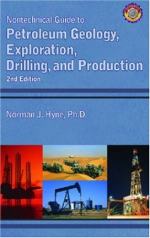|
This section contains 6,189 words (approx. 21 pages at 300 words per page) |

|
 Table 2. Typical Power Requirements by Product Category
Table 2. Typical Power Requirements by Product Category
After all the exploratory analyses, drilling determines whether the exploration geophysicist has accurately located the reservoir (exploratory drilling) and whether the sites chosen for drilling into the same reservoir are optimal for efficient production (developmental drilling). When an exploratory hole produces neither oil nor gas, it is capped and abandoned. But if it does yield oil or gas, it is readied for production and becomes a completed well. To extract oil and gas requires drilling a well.
Drilling a well involves much more than making a hole. It entails the integration of complex technologies, requiring the driller to make individual decisions related to unexpected pressure regimes, practices, and rock formations. The resulting well is the sole conduit to move fluids from a reservoir to the surface—a conduit that must last at least...
|
This section contains 6,189 words (approx. 21 pages at 300 words per page) |

|


